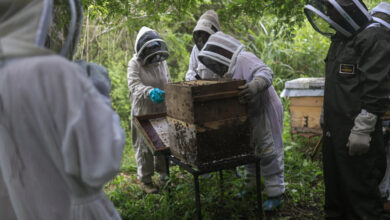Best Books For Children During the Pandemic
Marcela Escovar, owner of the social project for reading with children, present in various countries, talks to The Women Post about the role of books on children's development and some reading suggestions for them during the pandemic.

The Woman Post | Catalina Mejía
Escucha este artículo
Catalina Mejía: Could you tell us a little bit about yourself?
Marcela Escovar: I have a strong passion for reading, which lead me to study literature and then a ME in Children’s literature and Literacies at the University of Glasgow- Scotland. I grew up surrounded by books, and only as an adult, I realized this was a great opportunity for building my dreams. For that reason I decided to focus my career in work promoting spaces to share reading experiences with children, of course, starting at home.
CM: How was “Picnic de Palabras” born and what's your mission with this social project?
ME: Picnic was born in a very hard moment in my life, my dad got sick and I wanted to find a way to share with others the love of reading that he taught me. Thanks to my work on that time in reading projects that supported Colombian librarians, I questioned myself what could do with the resources and knowledge I had? After some talking with friends, we decided to go to a park and test what would happen if we shared some children’s books with families? Picnic de Palabras born as a reading project where we share our love for wonderful stories with children, adults, and volunteers who have joined us over these 8 years in various countries. Our motivation is to show others the importance of reading and the joy that emerges when you try it with your family in green spaces, which are usually for outdoor playing.
CM: What role do you believe that literature plays in children’s development?
ME: It's a unique opportunity to connect and understand their inner world. The main characters work as mirrors for the readers to recognize themselves and to know they are not alone in their feelings. According to the age of the reader, there are certain books that support their development process. It's important to know what children like to identify the books that capture their attention. Sometimes, we, as adults, give them so many readings that they get lost or bored. The first step, before buying books, is going to public libraries with the kids and exploring together the books that are selected by them or asking the librarian for suggestions.
Also read: Children Become What They Dream of Using Technology Properly
CM: What do you think are the main subjects that children’s books (ages 4 to 8) should address during the pandemic?
ME: I recommend picture books where children can explore, read, laugh, enjoy and interpret illustrations with meaningful stories such as "The Wolf, the Duck, and the Mouse," written by Marc Barnett, as an example.
The key to selecting books lies in our own reading experience. In other words, when you read a book that deeply engages you for any reason, that is a signal to know that someone else might be moved by the book as well. In the case of children, they are smart and demanding, so we need to look forward to quality in terms of content and illustrations at the same level.
CM: Could you recommend mothers 3 books to read to their children (ages 4-8) bearing in mind all the feelings that they can have during the pandemic?
ME: "Press Here" written by Hervé Tullet because this is an interactive printed picture book that invites the reader to play and to be an active participant. This is a classic in our Picnic de Palabras reading experiences.
"The Lost Thing" by Shaun Tan, this book explores the meaning of being different, accepted, and unique in a nonsense world.
"The Invention of Hugo Cabret" by Brian Selznick is a graphic novel, that explores the history of cinematography through the life of Hugo, an orphan boy who wants to reveal a message he thinks his father had to him before he died.
CM: Could you also briefly explain your choices?
ME: These three books invite the readers to be active, dream, play, accept fiction, and question their own situations. Sometimes, as adults, we could be sensors about books, but only the experiences of sharing them with children can give us the answers or maybe new questions of how they are thinking about difficult situations that books help them to share.
CM: Thank you, Marcela!




